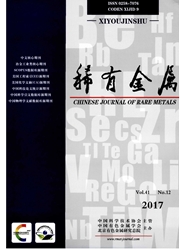

 中文摘要:
中文摘要:
基于晶体塑性有限元模型,采用ABAQUS商业软件对纯钛在模具通道夹角分别为90°,120°,135°时的单道次等径弯曲通道变形(ECAP)的织构演变进行模拟,研究通道夹角对纯钛ECAP变形织构演变的影响。同时利用90°模具实现纯钛的单道次ECAP变形,并采用X射线衍射(XRD)技术获得变形前后的极图分布。将实验与模拟结果比较,以验证模拟结果的可靠性。通过对ECAP变形规律及试样点极图分析,发现90°模具挤压时,柱面织构完全取代初始织构,形成B和C_2两种柱面织构,这与XRD实验结果基本一致,表明了模型的可靠性。模具通道夹角为120°时,形成了C_1和C_2两种柱面织构,但以C_2织构为主。模具通道夹角为135°时,开始出现较弱的C_1织构,仍以C_2织构为主,但接近通道外角的下表面仍存在初始织构。通过对纯钛在不同通道夹角的ECAP模具中变形后的数据分析,得出模具通道夹角为90°时工艺最佳。
 英文摘要:
英文摘要:
The texture evolution for pure titanium during single-pass equal channel angular pressing (ECAP) in channel angles of 90~, 120° and 135° was simulated respectively to study the influence of die channel angle on deformation texture evolution of pure titanium during equal channel angular pressing, which was based on the crystal plasticity finite element model (CPFEM) and the commercial software ABAQUS was used. At the same time, pure titanium was processed by ECAP using the channel angel of 90° at room temperature, then X-ray diffraction (XRD) technology was used to obtain the pole figures of the sample before and after deformation. The results of simulation and experiment were compared to verify the reliability of the model. By analyzing ECAP deformation regular and polar figures, it was found that the initial texture was replaced completely by prismatic texture in channel angle of 90~, and two kinds of texture ( B and C2 ) formed. This agreed well with the XRD results, showing the reliability of the model. Though two kinds of texture ( C1 and C2 ) formed for channel angle of 120° , the priority was C2 texture. For channel angle of 135°, the downside still retained initial texture, and the main texture was still C2 , but C1 texture began to form. Finally, the channel angle of 90° was the best processing condition for pure titanium through analyzing the data of different channel angles.
 同期刊论文项目
同期刊论文项目
 同项目期刊论文
同项目期刊论文
 期刊信息
期刊信息
